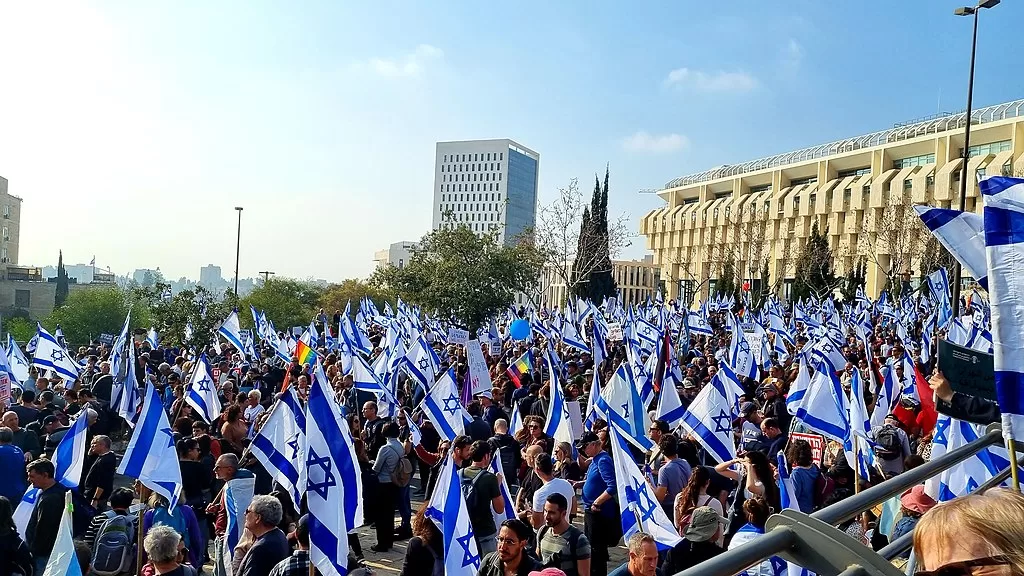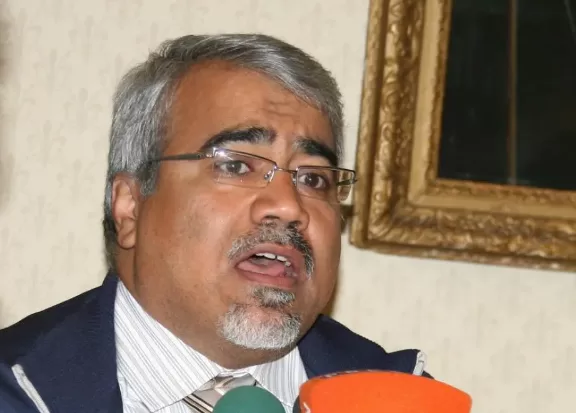 Journalist Ibrahim Eissa faces a prison sentence for his criticism of President Mubarak. The government’s intention to intimidate the free press is all too clear, writes Amira Howeidy
Journalist Ibrahim Eissa faces a prison sentence for his criticism of President Mubarak. The government’s intention to intimidate the free press is all too clear, writes Amira Howeidy
On 26 March a Cairo court sentenced Ibrahim Eissa, editor of the independent Al Dostour newspaper, to six months in prison for publishing a series of articles on 79-year-old president Hosni Mubarak’s health.
Eissa has the right to appeal the ruling, which he probably will, knowing all too well that he’ll end up in one of Egypt’s notorious prisons anyway.
This 42-year-old critic of the Mubarak regime still faces at least four other court cases concerning articles deemed ‘insulting’ to figures in the ruling party and, again, the president.
It is unlikely that Eissa will get out of this witch-hunt unscathed. These cases, like many others, are politically motivated. If he is found innocent of some charges, he’s bound to be found guilty and imprisoned on others. The 26 March verdict — made available in a 21-page paper explaining the legal grounds of the sentence — best demonstrates this assumption.
The paper said that Eissa crossed the legal boundaries when he published reports in his newspaper based on a rumour suggesting that president Mubarak was suffering a health problem, ‘even though’ the president had made several public appearances in an attempt to dispel the rumour.
By printing articles questioning the president’s health condition, the court said, Al Dostour had demonstrated a premeditated ‘ill will’. In doing so, Eissa had sparked ‘fear’, ‘chaos’ and ‘panic’ within Egyptian society, and had also damaged the economy by causing investors to pull capital from the stock market.
Some might wonder why or how one sole journalist in the Arab world’s most populous country could have such a profound influence on the economy, or public opinion for that matter. He doesn’t. What he does have, however, is the courage to defy the ‘red lines’ imposed by Egypt’s authoritarian regime. It is becoming clear that out of all the journalists dragged to court over the past year, its Eissa’s head that’s wanted, because he called things by their right names.
Instead of criticising ‘the government’, which is a popular and safe euphemism amongst Egyptian journalists to refer to the president — and recently his son Gamal — Eissa had absolutely no qualms in pointing an accusing finger to Mubarak, his son and their entourage by name when he found them responsible for Egypt’s woes. Nor did his relentless anti-dictatorship and anti-corruption journalism run out of steam, though he knew all too well that it could cost him his freedom.
When rumours spread last summer that Mubarak’s health was in critical condition, Al Dostour did what any newspaper would: report the news. Because Egypt’s constitution gives the president absolute authority — which makes him the most important official in the republic and consequently makes this a very sensitive issue, Al Dostour gave this story the prominence it deserved. Back then, Eissa challenged the ‘secrecy’ surrounding Mubarak’s health, arguing that it wasn’t a personal matter to be kept away from the public, but an issue of national concern. It wasn’t the media’s fault that because of tampering with the Egyptian constitution, the fate of an entire nation hinges upon the health of one man. This is what dictatorship is about.
Ever since he assumed office in 1981, Mubarak has refused to appoint a deputy. In the past decade, the growing political influence of his younger son Gamal triggered speculation on his perceived ambition to succeed his father. It was during that time that a dissent movement emerged to pressure the regime to allow a democratic change of power. Instead, Mubarak amended the constitution to entrench his party’s grip on power and exclude other political forces from political participation. The dissent movement relied heavily on the newly established private and independent press in its campaign to influence public opinion. This is how the private press came to play a crucial role in the struggle for democratic transformation in Egypt. Al Dostour’s fearless tone made it stand out.
What makes Eissa’s case particularly alarming is the shocking silence of the Egyptian Press Syndicate, which has ignored the decision to imprison him altogether. Its new elected chairman, Makram Mohamed Ahmed — who was backed by the state-run media in his election campaign last November — told AP that a ‘compromise’ could be reached between Eissa and Mubarak’s ruling party. He suggested that journalists accept a government-proposed ‘code of ethics’ that would ban criticism of the president and his family.
Egypt is currently going through a critical stage of economic, political and social instability. Various sectors of society — from judges and medical doctors to labourers and university professors — are resorting to strikes to protest poor wages and corruption. Recently, clashes have been breaking out amongst Egyptians waiting in long lines for government-subsidised bread, causing a nationwide crisis. The president has been forced to use the army to supervise bread production.
It is imperative for the regime at this volatile stage to secure its grip on power and silence the press. It’s no coincidence that Egypt’s information minister formulated an agreement, adopted by 20 Arab states in Cairo in February, to punish satellite channels for offending Arab leaders. Previous harassment of journalists attests to the ongoing crackdown on independent reporters, who remain a thorn in the regime’s neck.
If journalists accept the compromise floated by the Press Syndicate’s chairman, it will be a setback for the gains and efforts of independent journalists who refused to kowtow in their quest for the truth. In Egypt’s current transitional phase, it is imperative for independent voices to remain fearless, or risk worst days to come.




